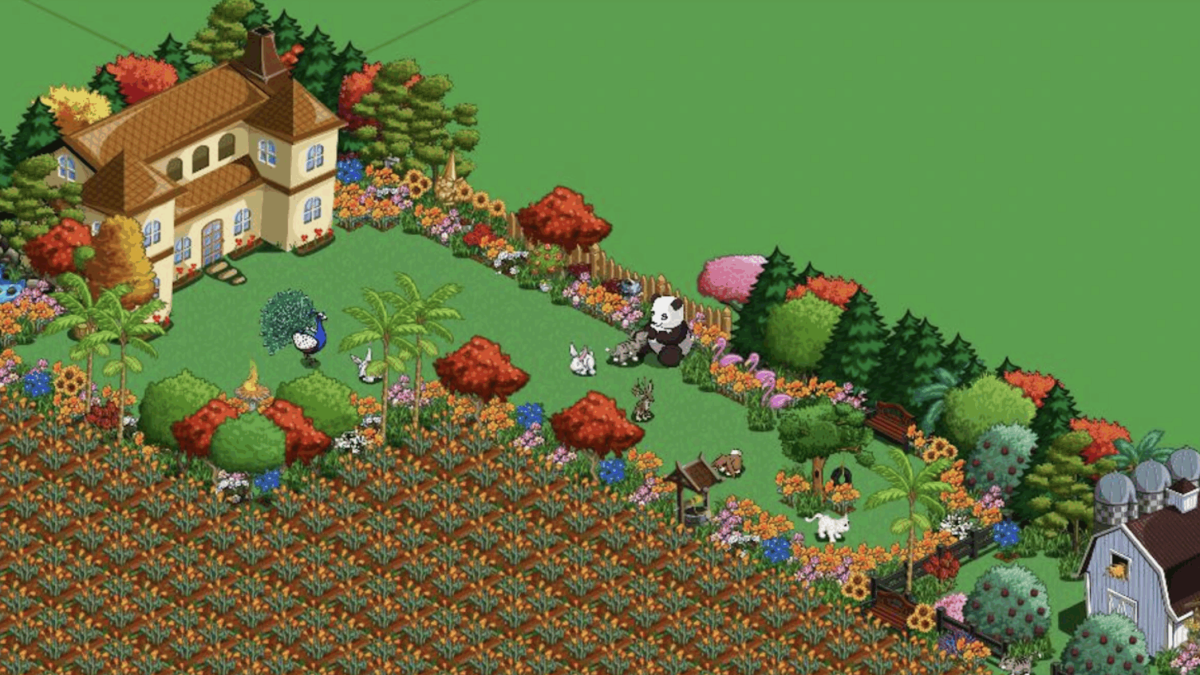The first thing everybody notices about Mehmet Aydın is his baby face. It’s not just that he’s a chubby guy; it’s that his face has a certain look, all round and soft and cherubic, and he just looks like he wouldn’t hurt a fly. Aydın knew his face could be his superpower: an instantly irrefutable proof of his good intentions.
Article continues after advertisement
But there was always more to Aydın than his aw-shucks dimples. Deep inside, he was a bad boy. Before he bought his Ferrari and his yacht, before his company set off a craze that gripped all of Turkey, before he became a household name in his country and an obsession of tabloid journalists, before all that, from around 2012, Mehmet Aydın had a dream: to become a Turkish hip-hop superstar.
Described as a “farming simulator,” FarmVille let bored people all over the world dream of their own pastoral future.
He didn’t have a lot going for him: a twenty-something religious-school dropout from a small provincial city in Turkey doesn’t have an obvious entry point into show business. Making it takes money, and he didn’t have any. To make some, he reportedly dabbled with peddling phony “X-ray glasses” that supposedly showed people naked, but he soon realized this was a dead end. So, he got by on dishwashing jobs or waiting on tables at a café in town. He’d get back home late, tired, and lay down some rap tracks on his laptop before heading to sleep.
That, or he’d play FarmVille.
Do you remember FarmVille? It was all the rage on Facebook back in 2013–2015. Described as a “farming simulator,” FarmVille let bored people all over the world dream of their own pastoral future. For a kid like Mehmet, who grew up in a farming family in Bursa, two hours south of Istanbul, there was something soothing about this digital rural idyll: like a slice of the most comforting memories of his childhood served up in digital form.
If FarmVille were addictive, wouldn’t a real-world FarmVille be ten times more addictive?
Soon, Aydın got to thinking. FarmVille wasn’t bad, but something was missing. It was all digital, all plastic, all fake. There weren’t any real cows there, or crops, or chickens—just pixels. What if, he thought, you could have a FarmVille that came with a real-world counterpart? What if the cows on the screen were digital representations, screen doubles of real cows on a real pasture on a real farm in the real world?
If FarmVille were addictive, wouldn’t a real-world FarmVille be ten times more addictive?
Aydın didn’t know how to program a computer game, but he had friends who did. Soon, the chubby kid with big hip-hop dreams was running a little squad of coders putting together a FarmVille clone. On the surface, Çiftlik Bank—Turkish for Farm Bank—was little more than a FarmVille rip-off; the functionality for tending to digital crops and livestock was lifted more or less straight from their competitor.
But Farm Bank would be different, because it would have a real-world dimension. The company announced it would run real farms, which Farm Bank players could invest in by putting real-world money into their fake-world app. And, in what should have been the first red flag, players would also receive a small real-money payoff for each new player they brought into Farm Bank.
Launched early in 2016, Çiftlik Bank was a hit. The game was fun, and word soon got around that the money you could make from the farm side was mind-blowing. Early investors would get fat checks in the mail once a month: the dividends, they were told, from Farm Bank’s real-world farming operation. It all seemed real enough: the company’s young CEO, Mehmet Aydın, was in the media cutting ribbons on big commercial farms. The events were lavishly covered in the media: photos showed the young, rosy-cheeked Aydın flanked by provincial officials cutting ceremonial ribbons on muddy farm fields.
Mehmet Aydın would later claim that he’d never intended for things to get so far out of hand.
And it wasn’t just the farms; it was the distribution network too. All around Turkey, Farm Bank produce stands were popping up. For about 100,000 Turkish lira (some $30,000 at the time), you could buy a Farm Bank franchise and open up a shop selling sausage, cheese, butter, honey, and other Turkish farm staples. At its height in 2017, there were 150 Farm Bank deli counters slinging cheese that supposedly came from the company’s farms. (None of it did.)
Mehmet Aydın would later claim that he’d never intended for things to get so far out of hand. Maybe so. But if so, that original dream did not last long in the face of the torrent of money that soon started flooding his way.
All through 2016 and 2017, Farm Bank grew at a startling rate. The company Aydın founded prized growth in membership above everything else, and for good reason. He was paying old investors’ dividends directly out of the money new investors were putting in. And when you’re running a Ponzi scheme, the prime directive is clear: keep new investors coming in the door at any cost.
Farm Bank invested heavily in advertising online and made sure each new player knew they would get paid for bringing in still more players. When that proved not enough, the company went on TV, putting up slickly produced commercials that sold the Farm Bank dream to the masses.
Farm Bank’s marketing hardly touched the computer-game side of the business. Instead, they targeted young Turkish city dwellers’ dreams of reconnecting with the real Turkey—that is, rural Turkey. Idealized images of the Turkish countryside were the center of Farm Bank’s pitch.
The company got Turkish movie legend Mehmet Çevik as a pitchman. The rotund Çevik plays a good, honest, salt-of-the-earth Anatolian farmer gravely advising his son, a round-faced but serious-looking child who very much resembled the way Aydın must have looked at ten or eleven.
“Listen to me, son,” the wise old farmer says, amid a verdant field against a dazzling blue sky, “if you care about the country and the nation, your goal must be clear, your horizons wide, your heart as vast as the blue sky, and you must stand tall!”
Aydın had put his finger on something important: a prior belief he could exploit.
The camera zooms in on the earnest farmer as he puts his hand on his child’s shoulder and cinematic music soars. “You will face obstacles. They will try to trip you up, but don’t fall, don’t you fall down and don’t ever give in.”
Aydın had put his finger on something important: a prior belief he could exploit. Millions of urban people in Turkey were nostalgic for the rural lives they had known as children or heard about from their parents. That, they felt, was the real Turkey. They believed that to be a real Turk, you needed a connection with that old-fashioned world of hard toil on the land. Messages that affirmed that belief felt true to them before they had even thought about them.
People loved it, and Farm Bank grew and grew, raking in cash as it looked to expand internationally.
All the while, Aydın was doing what Charles Ponzi had done almost a hundred years earlier: paying earlier investors directly from the cash put in by new ones. Farm Bank’s word-of-mouth reputation was, consequently, excellent. Who wouldn’t want to be involved with a fun, patriotic game that made you rich on the side? It was win-win.
To insiders, it all looked very different. Cudi Cumhur Yurdakul, Farm Bank’s then twenty-seven-year-old lead software developer, began to think something was off as he noticed Aydın’s spending was out of control. He spotted an internal report that said Aydın had paid $162,000 to charter a private jet to fly him and three others from Montevideo, Uruguay, back to Istanbul, including a $10,000 surcharge to allow his wife to smoke cigarettes on board.
Then, in November 2017, the government-aligned newspaper Sabah started asking hard questions about Farm Bank’s finances. Sabah noted that the company’s accounts were registered to shell companies and based in banks in Turkish-controlled Northern Cyprus. Turks know very well that Northern Cyprus is a notorious money-laundering hub, the kind of place where you set up a company if you want to obscure its finances. Inspectors from the Ministry of Customs and Trade began to look into the firm’s finances. The minute that happened, Farm Bank’s collapse was foretold.
Remarkably, Aydın was still “opening” new dairy farms as late as December 2017, inviting provincial officials to photo ops to cut ribbons—in reality, these were existing commercial farms his company was buying and leaving under preexisting management.
But trouble was in the air.
By early March 2018, the Ministry of Customs and Trade inspectors had enough evidence to show that Farm Bank was a fraudulent enterprise. But they moved too slowly. By then, Mehmet Aydın had skipped town, allegedly taking $80 million worth of investor money with him.
In just two years Farm Bank had allegedly swindled some $250 million from 132,000 investors.
In March, a Turkish expat in Montevideo, Uruguay, spotted that unmistakable baby face recklessly driving a brand-new white Ferrari and caught him on a cell phone video.
So, Aydın skipped town again.
By the end of March 2018 Aydın seemed unsure whether to try to clear his name or lay low, vacillating between the two strategies. By then, Interpol had issued a Red Letter, putting police forces around the world on notice to arrest Aydın wherever he may be. Farm Bank’s ripped-off investors banded together to hire an investigator to scour the world for their man. Then he was located in a posh suburb of São Paulo, Brazil.
Feeling the net tightening around him, Aydın surrendered to the Turkish consulate in São Paulo on July 1, 2020. He was quickly sent back to Turkey, where he told investigators that Uruguayan officials had seized his Ferrari and his yacht. All the money he had left, he said, was the thirteen dollars in cash in his wallet. In just two years Farm Bank had allegedly swindled some $250 million from 132,000 investors. Aydın had purportedly pocketed some $80 million of it…and seems to have burned through all of it in just three years.
A true feat of charlatanry. But he did not get away with it in the end. In February 2025, a Turkish court sentenced him to more than 45,370 years in prison.
__________________________________

Excerpted from Charlatans: How Grifters, Swindlers, and Hucksters Bamboozle the Media, the Markets, and the Masses by Moisés Naím and Quico Toro, copyright ©2025 by Moisés Naím and Francisco Toro. Used with permission of Basic Books, a division of Hachette Book Group, Inc.
